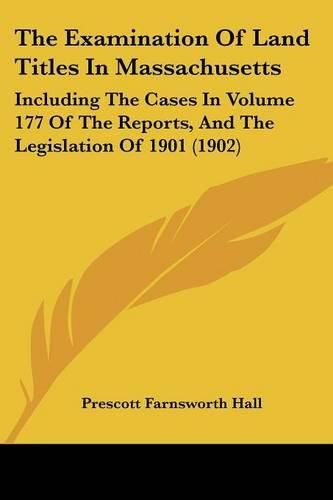Readings Newsletter
Become a Readings Member to make your shopping experience even easier.
Sign in or sign up for free!
You’re not far away from qualifying for FREE standard shipping within Australia
You’ve qualified for FREE standard shipping within Australia
The cart is loading…






Purchase of this book includes free trial access to www.million-books.com where you can read more than a million books for free. This is an OCR edition with typos. Excerpt from book: - As to these provisions, see infra, 13, Deeds. Prior to St. 1849, c. 205, a power of attorney not acknowledged or proved and not recorded could be given in evidence to support a title.04 Between June 1, 1849, and February 28, 1879, a power of attorney given by husband and wife to authorize conveyances of her real estate, and not merely for the release of her dower, had to be acknowledged by both the husband and the wife. 5 5 6. Bankruptcy.
The first bankruptcy act provided that the commissioners of a bankrupt should have the power by deed under their hands and seals to assign and convey to the assignee any lauds of the bankrupt; and all such deeds being duly executed and recorded according to the laws of the state within which such lands, tenements or hereditaments may be situate, shall be good and effectual against all persons whom the said bankrupt by common recovery or other means, might or could bar of any estate, right, title or possibility of or in the said lands tenements or hereditaments. 67 The act was repealed by an act approved December 19, 1803, but pending matters were not affected by the repeal.88 The act of 1841 provided that, by the decree declaring S 29; St 1879, c. 86; St. 1849. c. 205. Not cited in this connection to 177 Mass. 84 Valentine v. Piper, 22 Pick. 85, 91. Gen. St. c. 89, 29; St. 1849, c. 205, repealed by St. 1879, c. 86. as to this point. Compare infra, 27, Insolvency. i Act April 4. 1800, c. 19, 11 (2 Stat. 19).
Act Dec. 19, 1803, c. 6 (2 Stat. 248). a person a bankrupt, all his property should be divested out of him and vested in his assignee without any other act, assignment, or other conveyance whatsoever. 69 Whether the property of the bankrupt at the date of the filing of the petition went…
$9.00 standard shipping within Australia
FREE standard shipping within Australia for orders over $100.00
Express & International shipping calculated at checkout
Purchase of this book includes free trial access to www.million-books.com where you can read more than a million books for free. This is an OCR edition with typos. Excerpt from book: - As to these provisions, see infra, 13, Deeds. Prior to St. 1849, c. 205, a power of attorney not acknowledged or proved and not recorded could be given in evidence to support a title.04 Between June 1, 1849, and February 28, 1879, a power of attorney given by husband and wife to authorize conveyances of her real estate, and not merely for the release of her dower, had to be acknowledged by both the husband and the wife. 5 5 6. Bankruptcy.
The first bankruptcy act provided that the commissioners of a bankrupt should have the power by deed under their hands and seals to assign and convey to the assignee any lauds of the bankrupt; and all such deeds being duly executed and recorded according to the laws of the state within which such lands, tenements or hereditaments may be situate, shall be good and effectual against all persons whom the said bankrupt by common recovery or other means, might or could bar of any estate, right, title or possibility of or in the said lands tenements or hereditaments. 67 The act was repealed by an act approved December 19, 1803, but pending matters were not affected by the repeal.88 The act of 1841 provided that, by the decree declaring S 29; St 1879, c. 86; St. 1849. c. 205. Not cited in this connection to 177 Mass. 84 Valentine v. Piper, 22 Pick. 85, 91. Gen. St. c. 89, 29; St. 1849, c. 205, repealed by St. 1879, c. 86. as to this point. Compare infra, 27, Insolvency. i Act April 4. 1800, c. 19, 11 (2 Stat. 19).
Act Dec. 19, 1803, c. 6 (2 Stat. 248). a person a bankrupt, all his property should be divested out of him and vested in his assignee without any other act, assignment, or other conveyance whatsoever. 69 Whether the property of the bankrupt at the date of the filing of the petition went…